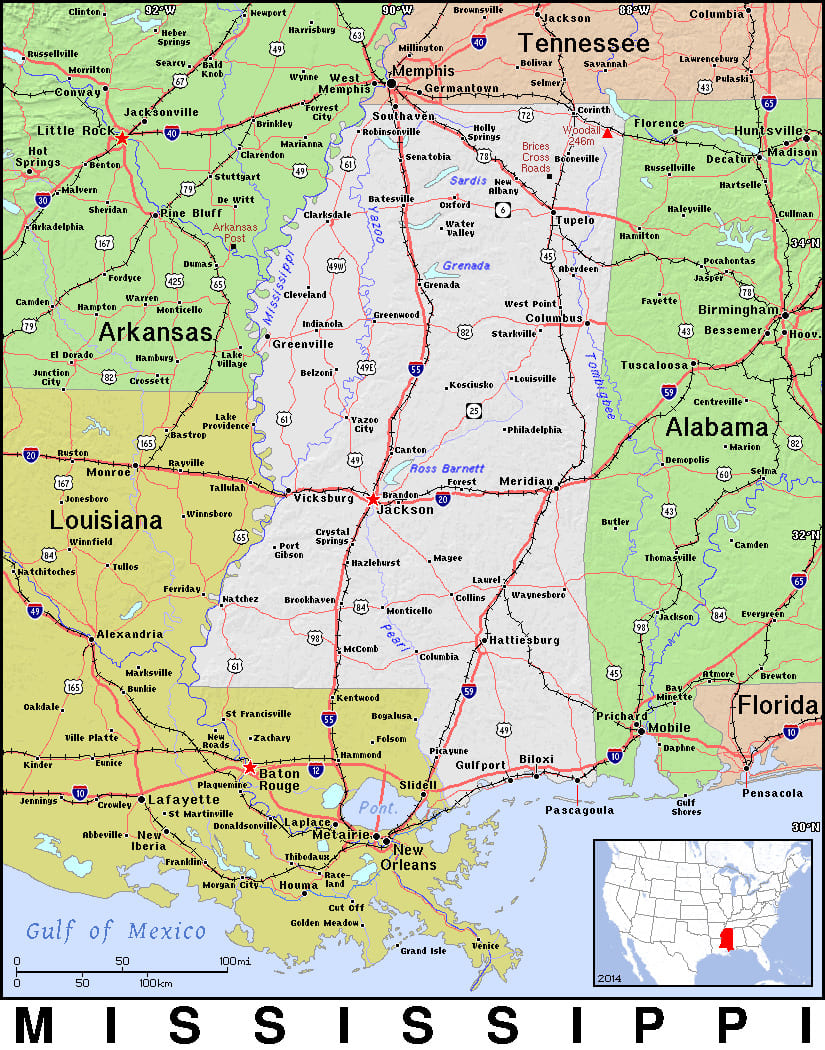Explore the Fascinating History of Mississippi
Take our Mississippi Trivia Quizzes for a Chance to Win a 6-Month Subscription to History By Mail!

The History of Mississippi
Journey Through Mississippi Trivia
Welcome to our Mississippi history and trivia page, presented by History By Mail. Join us as we delve into the captivating past and remarkable culture of the Magnolia State. From the mighty Mississippi River to the birthplace of blues music, we'll uncover some of Mississippi's hidden treasures and challenge your knowledge with fun quizzes. Let's embark on our journey through Mississippi's history and trivia together.
Mississippi is a state filled with intriguing stories and a distinct heritage. From the Native American tribes who inhabited the land for centuries to the impact of European colonization and the Civil War, Mississippi has left an indelible mark on American history. Its fertile Delta region, charming southern cities like Natchez and Biloxi, and the iconic Mississippi Blues Trail offer a unique blend of natural beauty and cultural heritage. Today, Mississippi is cherished for its warm hospitality, rich musical traditions, and a spirit of resilience that reflects the enduring spirit of the South.
Facts about Mississippi
State Name: Mississippi
State Abbreviation: MS
Capital: Jackson
Name Origin: The name "Mississippi," derived from the Ojibwe language meaning "big river," pays tribute to the mighty Mississippi River despite the Ojibwe people not originating from this region.
Nickname: The Magnolia State
Statehood: December 10, 1817 (20th State)
State Motto: "Virtute et armis" (By valor and arms)

Mississippi's Flag
The Mississippi state flag was adopted in 1894 and consists of a magnolia tree in the center against a field of blue. The magnolia, the state flower, is encircled by a white star, symbolizing Mississippi's status as the 20th state to join the Union. The field of blue represents loyalty and perseverance. The flag's design represents the natural beauty and rich heritage of Mississippi. It was officially approved by the Mississippi Legislature and has been proudly flown since its adoption.
Mississippi's Great Seal
The Mississippi State Seal was designed by a committee and adopted as the official seal in 1818. The seal features an eagle holding an olive branch and arrows, symbolizing peace and preparedness for war, respectively. The eagle is placed in a circular border, with the words "The Great Seal of the State of Mississippi" encircling it. The design represents the principles of strength, unity, and vigilance. State law governs the use and display of the Mississippi State Seal, ensuring its proper representation and significance.

--- State Trivia #1 ---
History of Mississippi
The history of Mississippi dates back to ancient times, with evidence of human habitation dating back at least 12,000 years. Native American tribes, including the Choctaw, Chickasaw, Natchez, and Tunica, inhabited the land for centuries, establishing rich cultural traditions. Today, several Native American tribes still call Mississippi their home.
European exploration of the region began in the 16th century, with Spanish and French explorers venturing into the area. In the early 18th century, France established control over the region, but after the French and Indian War, it was ceded to Great Britain. With the signing of the Treaty of Paris in 1783, Mississippi became part of the United States.
Mississippi became a territory in 1798, and on December 10, 1817, it was admitted to the Union as the 20th state. The state played a significant role in the Civil War, with many battles fought on its soil.
In more recent history, Mississippi has been known for its contributions to music, particularly blues and gospel. Artists like B.B. King, Elvis Presley, and Muddy Waters have roots in Mississippi, shaping the music industry.
Today, Mississippi remains a state with a rich cultural heritage, diverse natural landscapes, and a deep connection to its historical roots. It continues to contribute to various industries, including agriculture, manufacturing, and tourism.
State Symbols
Fun Facts
- The Mississippi River, one of the longest rivers in North America, runs through the western border of the state, spanning approximately 2,320 miles in length.
- Mississippi is known for its beautiful Gulf Coast, offering 62 miles of scenic coastline along the Gulf of Mexico.
- Tupelo, Mississippi is the birthplace of music legend Elvis Presley. Visitors can explore the Elvis Presley Birthplace and Museum to learn about his early life and influential career.
- The Vicksburg National Military Park in Vicksburg, Mississippi preserves the site of a significant Civil War battle and offers visitors a chance to delve into the history and impact of the war.
- Mississippi is renowned for its contributions to American literature, with notable writers like William Faulkner and Eudora Welty hailing from the state.
- The state's capital, Jackson, is home to the Mississippi Museum of Art, which features a diverse collection of visual artworks from local and international artists.
- Mississippi's cuisine is celebrated for its soulful flavors and includes iconic dishes such as fried catfish, hushpuppies, gumbo, and sweet potato pie.
- With its rich musical heritage, Mississippi is often referred to as the "Birthplace of the Blues," having been the birthplace of influential blues musicians like B.B. King, Robert Johnson, and Muddy Waters.
--- State Trivia #2 ---

Things To Do in Mississippi
- Explore the Mississippi River: The mighty Mississippi flows through the state, offering a range of activities for visitors. Take a riverboat cruise and soak in the scenic views, go fishing for catfish or bass, or simply enjoy a leisurely stroll along the riverbanks.
- Visit Natchez: This historic city on the Mississippi River is known for its antebellum mansions and rich Southern heritage. Take a guided tour of the beautifully preserved homes, visit the Natchez National Historical Park, and experience the charm of this picturesque town.
- Discover the Blues Trail: Mississippi is the birthplace of the blues, and following the Blues Trail is a must for music enthusiasts. Travel through iconic cities like Clarksdale, Jackson, and Vicksburg, and explore the historic juke joints, blues museums, and live music venues that showcase the rich musical heritage of the state.
- Experience the Gulf Coast: Mississippi's coastline along the Gulf of Mexico offers miles of beautiful beaches and a vibrant coastal culture. Relax on the white sand beaches, try your luck at the casinos in Biloxi, indulge in fresh seafood, or take a boat tour to explore the diverse marine life and coastal ecosystems.
- Explore Vicksburg National Military Park: Step back in time and visit this historic park that preserves the site of the Civil War Battle of Vicksburg. Explore the museum and the extensive network of trenches, monuments, and historic markers, and gain insights into one of the most significant battles of the war.
- Visit Tupelo: Birthplace of legendary musician Elvis Presley, Tupelo offers a fascinating glimpse into the life and legacy of the King of Rock 'n' Roll. Visit the Elvis Presley Birthplace and Museum, explore the Tupelo Automobile Museum, and immerse yourself in the rich musical history of this vibrant city.
- Experience the Mississippi Delta: Known as the birthplace of the blues and the land of cotton, the Mississippi Delta is a culturally rich region that has shaped American music and history. Visit the Delta Blues Museum in Clarksdale, take a scenic drive along the Great River Road, and explore the small towns and plantations that showcase the Delta's unique heritage.
- Embark on a Riverboat Cruise: Mississippi Riverboat cruises offer a unique way to experience the scenic beauty and history of the state. Hop aboard a traditional paddlewheel boat, enjoy live entertainment, dine on delicious Southern cuisine, and discover the captivating stories and legends associated with the river.
- Indulge in Southern Cuisine: Mississippi is known for its mouthwatering Southern cuisine. From savory dishes like fried chicken and catfish to delectable desserts like pecan pie and sweet potato casserole, there's no shortage of culinary delights to satisfy your taste buds. Explore local eateries and sample the flavors that make Mississippi's cuisine so renowned.
- Immerse Yourself in Civil Rights History: Mississippi played a pivotal role in the Civil Rights Movement. Visit the Mississippi Civil Rights Museum in Jackson, explore the Medgar Evers Home Museum in Jackson, and take a tour of landmarks like the Emmett Till Interpretive Center in Sumner to gain a deeper understanding of the struggle for equality and the courageous individuals who fought for change.

General Map of Mississippi
Mississippi, known as the Magnolia State, is located in the southeastern United States. It shares its borders with Tennessee, Alabama, Louisiana, and Arkansas. Mississippi is characterized by its diverse landscape, rich history, and vibrant culture.
Famous People From Mississippi
--- State Trivia #3 ---
FREQUENTLY ASKED QUESTIONS (FAQ) ABOUT MISSISSIPPI
Mississippi's name comes from the Ojibwe (Chippewa) word "misi-ziibi," which means "Great River." The state's southern border is formed by the mighty Mississippi River, which has played a crucial role in the region's history, trade, and culture.
Mississippi was one of the Southern states that seceded from the Union in 1861, leading to the American Civil War. The state's decision to secede was rooted in disagreements over states' rights and the issue of slavery. Mississippi joined the Confederate States of America and became an important battleground during the war's Western Theater.
Yes, indeed! The state is home to the world's largest cypress tree, known as "The Senator." Located in the swamps of Cat Island National Wildlife Refuge, The Senator cypress tree stands at an impressive height of over 150 feet and is estimated to be around 1,500 years old.
Vicksburg, Mississippi, gained immense historical significance during the American Civil War. The city's strategic location on the bluffs overlooking the Mississippi River made it a key target for both Union and Confederate forces. The Siege of Vicksburg in 1863 was a pivotal event, as Union victory gave them control of the river and effectively split the Confederacy in two.







